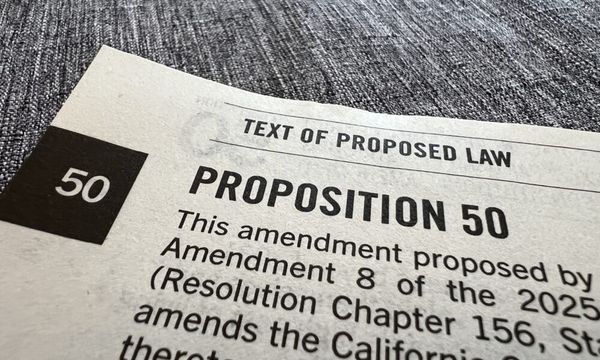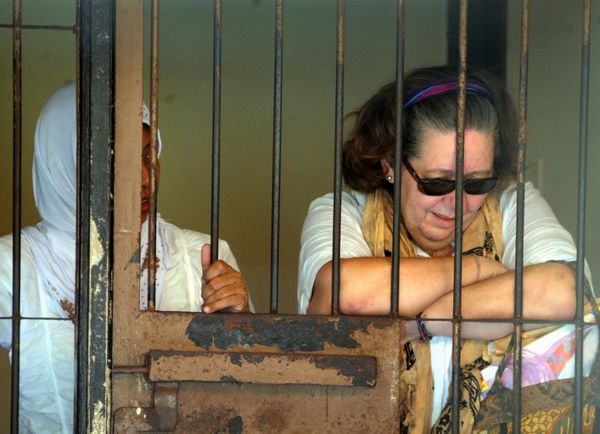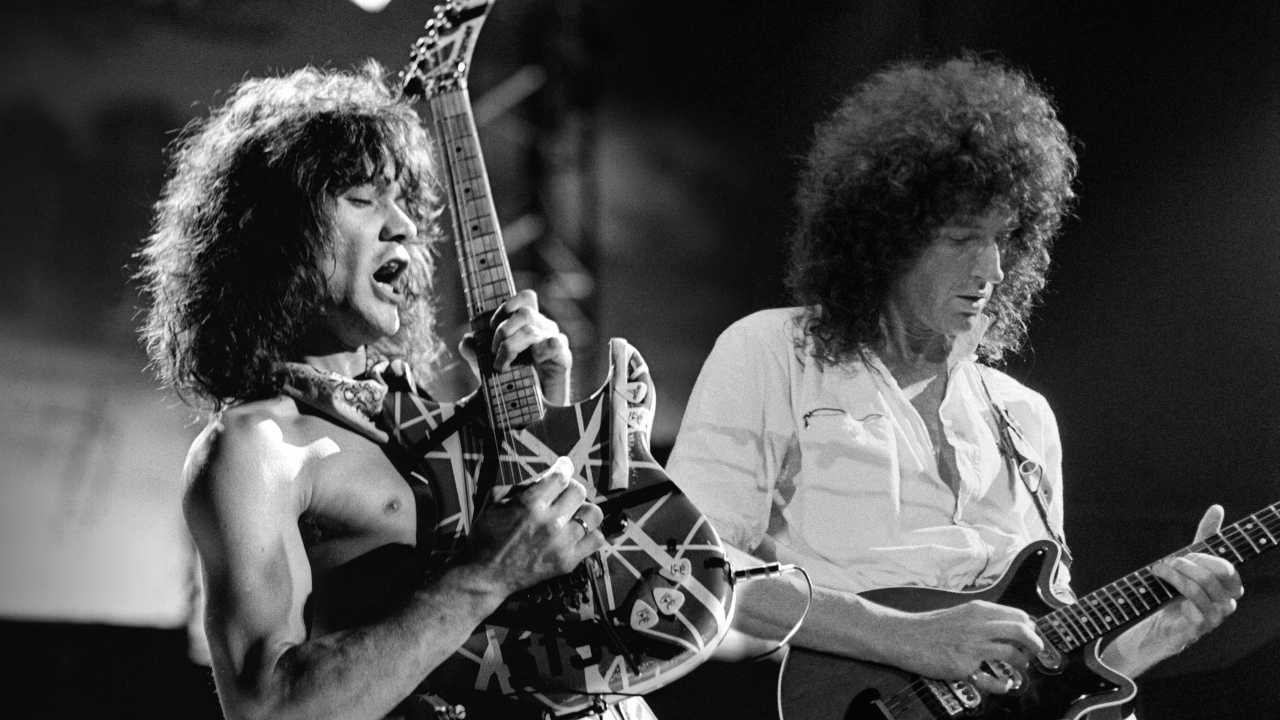
Brian May first saw Eddie Van Halen play live on October 30, 1978. The American guitarist’s eponymous band were supporting a flagging Black Sabbath at the Circus Krone, a former circus venue in Munich, Germany on a tour that has since passed into legend as a hard rock changing of the guard.
May had been invited to the show by his friend, Sabbath guitarist Tony Iommi. He knew next to nothing about the opening band; information wasn’t easy to come by in those pre-internet times, and his attention was focused on Queen anyway.
“I got there early, thinking:, ‘I wonder who these Van Halen people are? I wonder what they’re like?’” the recently knighted Queen guitarist says now. “I sat there watching them and my jaw just dropped. Watching Ed was like watching Jimi Hendrix for the first time. I was awestruck.”
Afterwards, May went backstage to say hello to Iommi. Eddie Van Halen was there too, and the two men struck up a conversation. “We just hit it off,” says May. “It felt like an easy friendship.”
The pair stayed in touch. Every so often one or the other would bring up the idea of jamming. “We’d say: ‘Oh, we should really get together,’ but it never happened,” says May.
Except it did happen, albeit five years after they first met. And when these two superstar guitarists did finally come together in an LA recording studio, in April 1983, it wasn’t for a high-profile, high-stakes supergroup. Instead it was for a three-track mini-album whose lead song was a version of the closing theme to a kids’ TV puppet show.
“It was a step into the unknown for me,” May says of the mini-album, titled Star Fleet Project after its lead track, Star Fleet. “But it was a chance to have some fun, play with guys I knew and liked, and finally have the opportunity to play with Ed.”
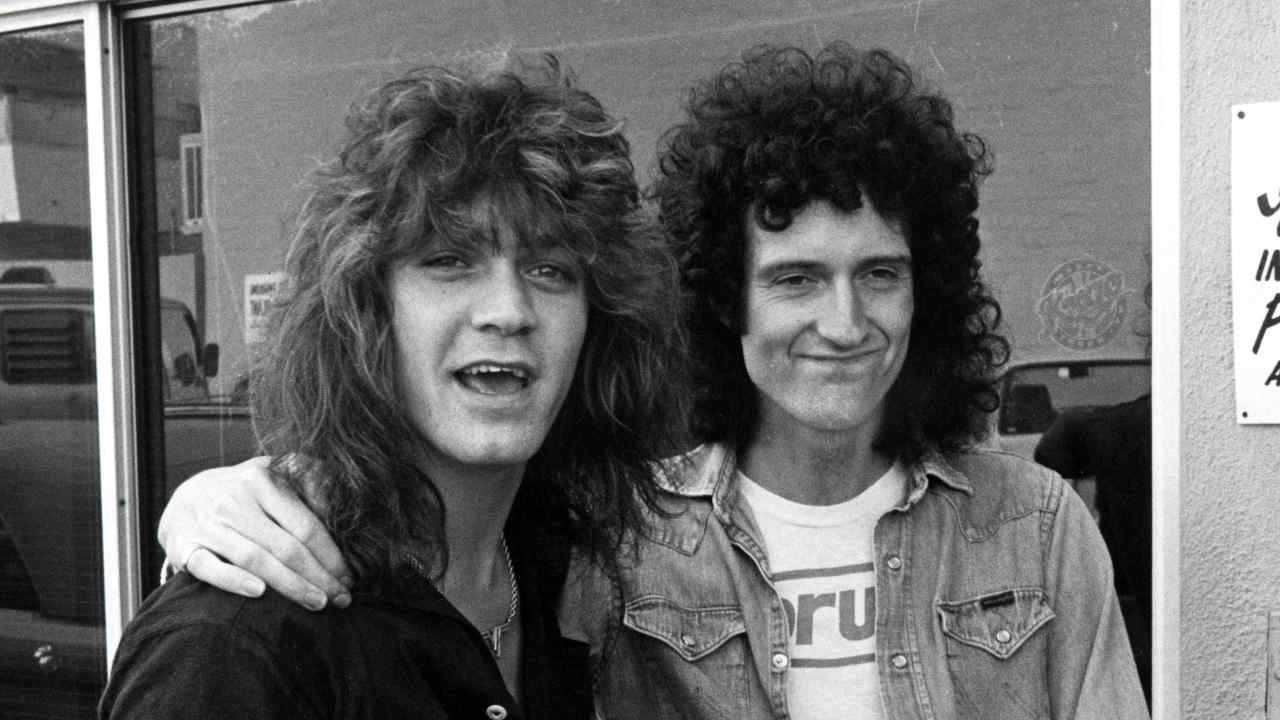
Forty years after its original release, the Star Fleet Project mini-album has been reissued as a lavish, out-take-packed box set. It’s an outlier in May’s back catalogue – not as familiar or successful as the albums he made with Queen, nor as fully fleshed out as the two hard-rock solo albums he released in the 90s. But, free of the pressures and expectations that came with his regular band, it’s the sound of a man having fun in the studio with his friends. As May writes in the sleeve notes of the reissue: “Those sessions are still there in my head, glowing like a warm beacon of joy in a period which for me was heading into uncertainty and darkness.”
If anyone can take credit for seeding the idea of Star Fleet Project in May’s head, it’s his son, James. James May was four years old when a new children’s sci-fi show featuring Gerry Anderson-style marionettes began airing on Saturday mornings on ITV in late 1982. Originally broadcast in Japan under the title X-Bomber, it had been dubbed into English and retitled Star Fleet for Western audiences. The repackaged show’s propulsive, synth-powered opening and closing theme were composed, and in the case of the latter, sung, by British composer and songwriter Paul Bliss.
“We used to get up every Saturday morning really early to watch the next episode together,” says May. “It was all very exciting to see what happened. And I enjoyed it as much as he did. I heard the signature tune and I thought: ‘Hmm, I like that. Maybe I could do something with it.’”
Queen were between albums at that point – “We’d made a conscious decision to lay off for a while,” says May – and the guitarist decided to make the most of his down time by heading out to Los Angeles.
“There’s something about LA where I feel more able to get out into the world,” he says. “I tend to be quite reclusive in England, it takes a lot to get me out. But in LA I wake up in the morning and think, ‘Who can I call? What should I do today?’”
It was on one of those days, in the spring of 1983, that he decided he should round up a few friends and go into the studio and have some fun. He knew just the people: REO Speedwagon drummer Alan Gratzer, former Rod Stewart/Jeff Beck bassist Phil Chen, and Queen’s touring keyboard player Fred Mandel. And then there was Eddie Van Halen.
“I immediately thought about Ed: ‘Wouldn’t it be great if we could actually get in there and play together?’” says May.
The admiration May felt for Eddie was mutual. Van Halen had told him his band were covering Now I’m Here as far back as 1974, long before Queen made their big US breakthrough.
“He pointed out little bits in their arrangements which were inspired by things we’d done,” says May. One of those things was the ‘tapping’ technique which had become Eddie’s signature. “He said: ‘Well, you did that on [Queen’s 1977 album track] It’s Late.’ I said: ‘Yeah, I only played with the idea because I’d seen this guy in Texas doing it.’ I’d done it in the most rudimentary form, then I’d moved on to something else. Whereas Ed basically made the guitar a new instrument.”
May didn’t have to give the idea of heading into the studio for a couple of days the hard sell to any of them, least of all Eddie. “I just got on the phone, and they all said: ‘Tell us what you want, we’ll be there, let’s go and have some fun.’ Explaining what it was came after.”
The idea of doing his version of the theme to his son’s favourite TV show was still kicking around his head. Aware that the other musicians wouldn’t have a clue what Star Fleet was, he made a rough demo and sent it to them.
“A very rough demo,” he says with a laugh. “It was just me singing into a tape machine and imitating guitars and drums. Phil and Ed came round to my little house in LA and we sat there going through it and kicking ideas around. It was just a great feeling from the beginning: ‘Yeah, let’s do it!’ It was like stepping into a place we’d never been.’”
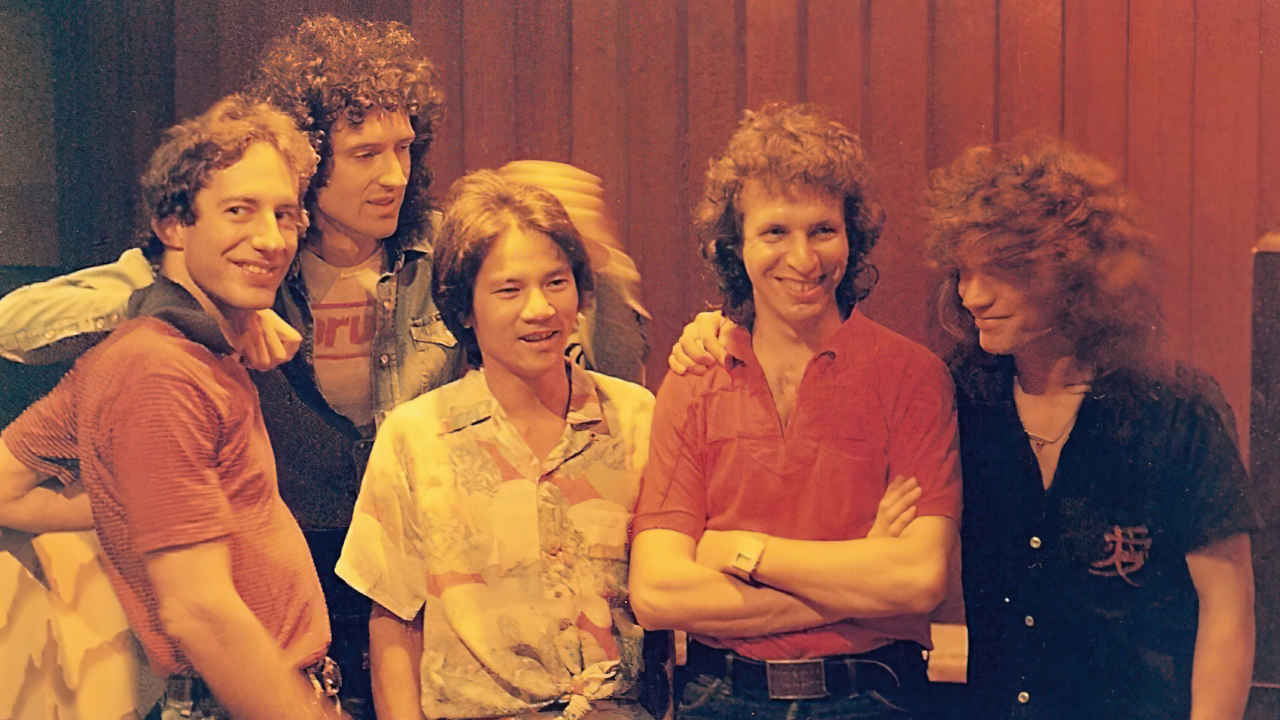
This hastily convened collective gathered at the Record Plant Studios in Hollywood on April 21 for the first day of their two-day session. With them was engineer Mike Beiriger, who had worked with Cheap Trick, among others, although May would be credited as producer. Queen sessions could be intense, competitive and sometimes fractious. It was clear from the start that these were different.
“We were hyped up, it wasn’t like being in the studio with your regular band,” says May. “At one point, Alan finished one of the takes and said: ‘This is so much fun, this is going to be like cheating on your wife.’ I don’t think he ever cheated on his wife, but that sums up the feeling. It was exhilarating. It felt like an illicit liaison.”
The plan was to keep it simple: no individual tracking, none of the analysis or debate that went into a Queen or Van Halen record, just five musicians playing off each other. “It was a total band recording session,” says May. “We were all there, plugged in, playing at the same time during every take.”
May’s version of the Star Fleet theme was the main focus. With vocals from May (‘Send a message out across the sky, alien raiders just passed Gemini’), it stayed true to the TV show theme that inspired it, although the original version was a jumping-off point. Here, it ran to eight minutes, the two guitarists pushed on by admiration rather than competition. May has a vivid recollection of what it felt like to play alongside Eddie Van Halen: “It was like going down a really challenging ski run. I was very much conscious of his talent and his incredible aura. But to hear the two guitars together was a blast. Not the same, by any means, but we locked together very easily.”
May had another song he wanted to record, a seven-minute blues number titled Let Me Out. The blues wasn’t an obvious part of Queen’s arsenal, although they’d dabbled on songs such as 1974 B-side See What A Fool I’ve Been and ZZ Top-esque News Of The World album track Sleeping On The Sidewalk. But the style was certainly part of May’s own musical DNA.
“It had always been there with me,” he says of the influence of the blues. “I think it was different for Freddie. He didn’t feel the blues. He felt rock’n’roll, he felt Elvis and Little Richard, but he didn’t feel Muddy Waters. He did feel Aretha Franklin, though, to the bottom of his heart. I think Freddie wanted to be Aretha Franklin.”
Let Me Out wasn’t as pre-planned as the album’s main track. May remembers singing it to the rest of them in the studio. “Once you get the hang of it, there’s really not that much to the song,” he told them. “It’s all in the feeling.”
Van Halen’s presence on Let Me Out isn’t as prominent as it is on the Star Fleet theme. “You can hear that he’s not particularly au fait with the song,’ says May. “He plays a few little bits as it goes along, chucking in a couple of notes. He’s waiting for the moment where he’s going to pitch in and try some licks.”
The musical theme continued on the mini-album’s final track, a spontaneous 13-minute blues workout that saw the two guitarists trading the kind of licks they’d grown up listening to years before. Its title was a dead giveaway: Blues Breaker (Dedicated To E.C.), a reference to John Mayall’s groundbreaking 60s blues-rock collective and their one-time star guitarist Eric Clapton.
“There’s all sorts of differences between the way Eric runs his life and the way I run mine, but he’ll always be my hero,” says May. “Every time I hear Key To Love [from 1966’s Blues Breakers With Eric Clapton, aka The Beano Album] I get chills up my spine. That’s why I do what I do, because Eric did that.
It wasn’t just May that Clapton influenced. “I remember Ed saying: ‘I haven’t played like this for a while. It’s how I started off playing. I wanted to play like Eric before I started all this tapping stuff.’”
May has a hazy memory of sending the finished song to the man who inspired it. “I think I did send it to Eric, but I never heard back,” says May. “He probably hated it, but that doesn’t matter to me.”
Overdubs on all three tracks were kept to a minimum. Chief among these was the run both guitarists played on Star Fleet. “We’d tried it during the takes but it always went wrong, more due to my mistakes than anything else,” says May. “We decided to put it in afterwards so not to distract ourselves any further.”
And so two of the pre-eminent guitarists of the era sat facing each other in the control room, instruments plugged in. “When the moment came we both went for the run,” May remembers. “It’s probably my favourite moment of the session.”
May had no plans to release the tracks the group had recorded. “But then when I’d got back to London and messed around with it and done mixes with [Queen producer] Mack, I just thought it would be a real shame if people didn’t hear it,” he says. (Queen bandmate Roger Taylor would add backing vocals to the chorus of Star Fleet.)
He called the other musicians. How would they feel if the tracks came out? “They were all up for it,” he says. “I made sure they all made some money out of it – which nobody asked for.”
The Star Fleet Project mini-album, credited to Brian May + Friends, was released on October 31, 1983. It peaked at No.35 in the UK. A heavily edited version of the lead track, fared less well as a single, falling outside the Top 50. Perhaps people were less interested in either May or Van Halen outside of the context of their respective bands, or maybe the idea of two of the most venerated rock stars on the planet teaming up for a song inspired by a kids’ TV theme was just too strange a concept. But chart positions weren’t really the point – this was about a group of musicians having fun.
The Star Fleet session turned out to be a one-off. After it was finished, everyone involved went back to their main bands. May returned to Queen, who released The Works, the following year, while Eddie Van Halen soon began work on the album that would become Van Halen’s 1984.
“We stayed in contact to a degree,” May says of his friendship with Eddie. “There was one particular time when I disgraced myself by falling over in a hotel bathroom because I wasn’t used to drinking at the rate he was drinking at. But we never played together again.”
There’s a sweet moment at the very end of Blues Breaker, the final song on the original mini-album, where the tape captures a snippet of conversation after the band have stopped playing. May can be heard saying: “I wish I’d done this more often in my life.” If it sounded heartfelt at the time, the death of Eddie in 2020 (and bassist Phil Chen the following year) casts it in a more poignant light today.
“I really wish I had done it more often,” says May. “I wish it more now than I did then. I wish I’d made those phone calls more often. Especially when you lose somebody, you think: ‘There were times when I could have picked up the phone.’ Life just takes you off in different directions.”
The reissued Star Fleet Project is out now via EMI




